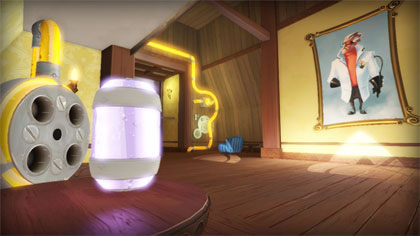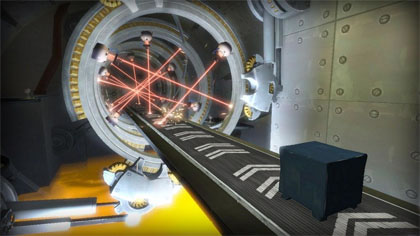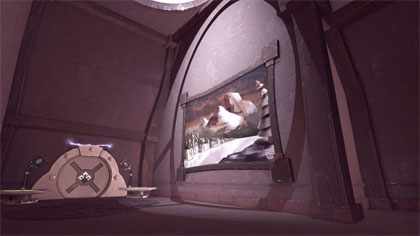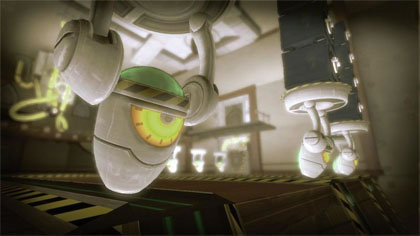- CLASSIC MAGAZINES
- REVIEW CREW
A show recapping what critics thought back
when classic games first came out! - NEXT GENERATION'S BEST & WORST
From the worst 1-star reviews to the best
5-stars can offer, this is Next Generation! - NINTENDO POWER (ARCHIVE)
Experience a variety of shows looking at the
often baffling history of Nintendo Power! - MAGAZINE RETROSPECTIVE
We're looking at the absolutely true history of
some of the most iconic game magazines ever! - SUPER PLAY'S TOP 600
The longest and most ambitious Super NES
countdown on the internet! - THEY SAID WHAT?
Debunking predictions and gossip found
in classic video game magazines! - NEXT GENERATION UNCOVERED
Cyril is back in this spin-off series, featuring the
cover critic review the art of Next Generation! - HARDCORE GAMER MAGAZING (PDF ISSUES)
Download all 36 issues of Hardcore Gamer
Magazine and relive the fun in PDF form!
- REVIEW CREW
- ELECTRONIC GAMING MONTHLY
- ELECTRONIC GAMING MONTHLY RANKS
From Mario to Sonic to Street Fighter, EGM
ranks classic game franchises and consoles! - ELECTRONIC GAMING MONTHLY BEST & WORST
Counting down EGM’s best and worst reviews
going year by year, from 1989 – 2009! - ELECTRONIC GAMING BEST & WORST AWARDS
11-part video series chronicling the ups and
downs of EGM’s Best & Worst Awards!
- ELECTRONIC GAMING MONTHLY RANKS
- GAME HISTORY
- GAME OVER: STORY BREAKDOWNS
Long-running series breaking down game
stories and analyzing their endings! - A BRIEF HISTORY OF GAMING w/ [NAME HERE]
Real history presented in a fun and pithy
format from a variety of game historians! - THE BLACK SHEEP
A series looking back at the black sheep
entries in popular game franchises! - INSTANT EXPERT
Everything you could possibly want to know
about a wide variety of gaming topics! - FREEZE FRAME
When something familiar happens in the games
industry, we're there to take a picture! - I'VE GOT YOUR NUMBER
Learn real video game history through a series
of number-themed episodes, starting at zero! - GREAT MOMENTS IN BAD ACTING
A joyous celebration of some of gaming's
absolute worst voice acting!
- GAME OVER: STORY BREAKDOWNS
- POPULAR SHOWS
- DG NEWS w/ LORNE RISELEY
Newsman Lorne Riseley hosts a regular
series looking at the hottest gaming news! - REVIEW REWIND
Cyril replays a game he reviewed 10+ years
ago to see if he got it right or wrong! - ON-RUNNING FEUDS
Defunct Games' longest-running show, with
editorials, observations and other fun oddities! - DEFUNCT GAMES QUIZ (ARCHIVE)
From online quizzes to game shows, we're
putting your video game knowledge to the test!- QUIZ: ONLINE PASS
Take a weekly quiz to see how well you know
the news and current gaming events! - QUIZ: KNOW THE GAME
One-on-one quiz show where contestants
find out if they actually know classic games! - QUIZ: THE LEADERBOARD
Can you guess the game based on the classic
review? Find out with The Leaderboard!
- QUIZ: ONLINE PASS
- DEFUNCT GAMES VS.
Cyril and the Defunct Games staff isn't afraid
to choose their favorite games and more! - CYRIL READS WORLDS OF POWER
Defunct Games recreates classic game
novelizations through the audio book format!
- DG NEWS w/ LORNE RISELEY
- COMEDY
- GAME EXPECTANCY
How long will your favorite hero live? We crunch
the numbers in this series about dying! - VIDEO GAME ADVICE
Famous game characters answer real personal
advice questions with a humorous slant! - FAKE GAMES: GUERILLA SCRAPBOOK
A long-running series about fake games and
the people who love them (covers included)! - WORST GAME EVER
A contest that attempts to create the worst
video game ever made, complete with covers! - LEVEL 1 STORIES
Literature based on the first stages of some
of your favorite classic video games! - THE COVER CRITIC
One of Defunct Games' earliest shows, Cover
Critic digs up some of the worst box art ever! - COMMERCIAL BREAK
Take a trip through some of the best and
worst video game advertisements of all time! - COMIC BOOK MODS
You've never seen comics like this before.
A curious mix of rewritten video game comics!
- GAME EXPECTANCY
- SERIES ARCHIVE
- NINTENDO SWITCH ONLINE ARCHIVE
A regularly-updated list of every Nintendo
Switch Online release, plus links to review! - PLAYSTATION PLUS CLASSIC ARCHIVE
A comprehensive list of every PlayStation
Plus classic release, including links! - RETRO-BIT PUBLISHING ARCHIVE
A regularly-updated list of every Retro-Bit
game released! - REVIEW MARATHONS w/ ADAM WALLACE
Join critic Adam Wallace as he takes us on a
classic review marathon with different themes!- DEFUNCT GAMES GOLF CLUB
Adam Wallace takes to the links to slice his way
through 72 classic golf game reviews! - 007 IN PIXELS
Adam Wallace takes on the world's greatest spy
as he reviews 15 weeks of James Bond games! - A SALUTE TO VAMPIRES
Adam Wallace is sinking his teeth into a series
covering Castlevania, BloodRayne and more! - CAPCOM'S CURSE
Adam Wallace is celebrating 13 days of Halloween
with a line-up of Capcom's scariest games! - THE FALL OF SUPERMAN
Adam Wallace is a man of steel for playing
some of the absolute worst Superman games! - THE 31 GAMES OF HALLOWEEN
Adam Wallace spends every day of October afraid
as he reviews some of the scariest games ever! - 12 WEEKS OF STAR TREK
Adam Wallace boldly goes where no critic has
gone before in this Star Trek marathon!
- DEFUNCT GAMES GOLF CLUB
- DAYS OF CHRISTMAS (ARCHIVE)
Annual holiday series with themed-episodes
that date all the way back to 2001!- 2015: 30 Ridiculous Retro Rumors
- 2014: 29 Magazines of Christmas
- 2013: 29 Questionable Power-Ups of Christmas
- 2012: 34 Theme Songs of Christmas
- 2011: 32 Game Endings of Christmas
- 2010: 31 Bonus Levels of Christmas
- 2009: 30 Genres of Christmas
- 2008: 29 Controls of Christmas
- 2007: 34 Cliches of Christmas
- 2006: 33 Consoles of Christmas
- 2005: 32 Articles of Christmas
- 2004: 31 Websites of Christmas
- 2003: 29 Issues of Christmas
- 2002: 28 Years of Christmas
- 2001: 33 Days of Christmas
- NINTENDO SWITCH ONLINE ARCHIVE
- REVIEW ARCHIVE
- FULL ARCHIVE
Quantum Conundrum
A long time ago I interviewed the makers of Field Commander, a PSP game that shamelessly ripped off Nintendo's Advance Wars series. I asked them about this critique, curious if they would get defensive and deny the obvious. To their credit, they acknowledged the influence and took on the charge. They told me that they were fine with being compared to Nintendo's classic strategy title, because, by their measurement, Advance Wars is one of the greatest games of all time.
I imagine the makers of Quantum Conundrum have a similar reaction when being compared to Portal. This is a game so similar to Valve's seminal puzzler that I'm surprised it's not litigious. All of the elements are in place -- test chambers full of puzzles, a disembodied voice commenting on everything you do, a companion cube, whimsical writing and, just to be safe, an indie nerdcore rock song to play out the credits. The only thing missing from Portal is the clever writing and the actual portals.

You play a voiceless kid who gets sucked into a wild adventure full of dimensional shifts, deadly lasers and gremlins. His uncle is a mad scientist who has spent his life developing ice beams and time machines. He lives is a gigantic mansion/laboratory on the edge of a giant cliff, precariously close to falling into the wicked waves below.
As luck would have it, your uncle has been sent into an alternate dimension. Unfortunately, this means he won't be able to go through these various challenges himself. Instead all he can do is look on and guide his nephew to victory. It's up to you to go in his place, completing the trials and restarting each wing of the mansion. Do that and you'll bring the whole family together, not to mention save the world from some catastrophic dimensional meltdown.
Each wing brings a new set of abilities to master. The first wing gives the player control over the weight of physical objects. With one touch of the button, our hero can turn a heavy safe into an object light as a feather. You are also able to make things heavy. This allows the player to turn a regular cardboard box into an object as heavy as a safe.

Before long the game introduces a new ability, a dimension that slows everything down. Suddenly this opens up a number of exciting new possibilities. You can pick up a safe and throw it into the air, trigger the slow motion, jump onto the safe suspended in midair and ride it across a bottomless gap. You can get past dangerous lasers and fan blades without being noticed. These three abilities give the developers a lot of room to come up with clever challenges.
Once you've mastered slow motion, the game throws one last dimensional shift at you. This time around you can remove gravity, pushing everything that isn't bolted to the floor up to the ceiling. Now you have the ability to not only ride a thrown object, but you can make it float indefinitely. Suddenly you are forced to think about object placement and what will happen when you reverse gravity.
No matter which dimension you trigger, our hero is impervious to its affects. That means that you will walk at normal speed when everything else is slowed down to a crawl. Better yet, you won't float to the ceiling when gravity is reversed and get weighed down when you make objects heavy. It's also worth noting that not all puzzles allow for every type of ability. Sometimes you'll have to pick and choose depending on the scenario.
While the game goes out of its way to resemble Portal, the puzzles themselves aren't all that similar. Valve challenged the mind, offering brain teasers that required some real thought. Quantum Conundrum, on the other hand, is more about platforming puzzles. While the game does feature a number of memorable head scratchers, most of the time you'll know exactly what to do from the moment you walk into the test chamber. The tricky part is getting your jumps right and activating each dimension at just the right time. These levels are challenging, but not in the same way as Portal.

Unfortunately, it's the first-person platforming that causes the first real significant problem. I've never been a fan of making precise jumps in a first-person point-of-view, but the movements here seem especially poor. It's not always easy to line-up tricky leaps and far too often my character wouldn't even jump when I pushed the button. To be fair to Airtight Games, these are problems that also plagued Portal. However, Quantum Conundrum spends far too much time on these mediocre platforming puzzles.
Too bad that's not the only problem. Quantum Conundrum tries its hardest to be a laugh out loud experience. Sadly, the writing isn't very good. It's easy to tell where the jokes are supposed to be, but every one of them landed flat on the floor. At times I wondered if it was actor John de Lancie's (Q from Star Trek: The Next Generation) bad timing that threw off the humor, but I ultimately chalked it up to him making the most out of what he was given. I spent most of the time trying to figure out if he was intentionally trying to imitate John Lithgow or not.

As good as the puzzles were, it's the writing everybody remembers about Portal. There are so many clever bits, and not just from this monstrous artificial life constantly haranguing the player. Portal surprises the player every step of the way, often in clever ways you would never have expected. You get none of that here. Even as the game goes down the predictable twist ending path, it's handled in such a way that undermines any real emotion.
Even though a lot of its elements are a mess, there are enough worthwhile puzzles in Quantum Conundrum to make it easy to recommend. There are moments when everything comes together and you see the game's true potential. Unfortunately, all too often those glorious moments are followed up by a horribly written one-liner and the distant memory of much better first-person puzzlers. Quantum Conundrum is in serious need of some original ideas.
HOME |
CONTACT |
NOW HIRING |
WHAT IS DEFUNCT GAMES? |
NINTENDO SWITCH ONLINE |
RETRO-BIT PUBLISHING
Retro-Bit |
Switch Planet |
The Halcyon Show |
Same Name, Different Game |
Dragnix |
Press the Buttons
Game Zone Online | Hardcore Gamer | The Dreamcast Junkyard | Video Game Blogger
Dr Strife | Games For Lunch | Mondo Cool Cast | Boxed Pixels | Sega CD Universe | Gaming Trend
Game Zone Online | Hardcore Gamer | The Dreamcast Junkyard | Video Game Blogger
Dr Strife | Games For Lunch | Mondo Cool Cast | Boxed Pixels | Sega CD Universe | Gaming Trend
Copyright © 2001-2025 Defunct Games
All rights reserved. All trademarks are properties of their respective owners.
All rights reserved. All trademarks are properties of their respective owners.































